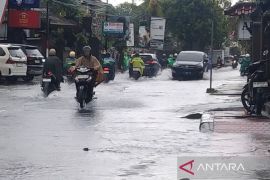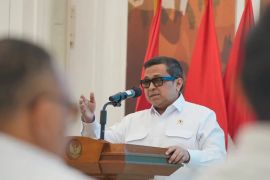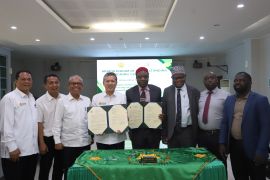The hardest hit are some districts in Central and East Java, West and East Nusa Tenggara, and Lebak District in Banten Province.Jakarta (ANTARA News) - Drought has parched Indonesias numerous regions and is feared to cause losses to crops, slow down economic growth, and disrupt water supply.
The hardest hit are some districts in Central and East Java, West and East Nusa Tenggara, and Lebak District in Banten Province.
Lebak District is experiencing a serious drought, and it will be a challenge to meet its water requirements in the upcoming months.
Therefore, hundreds of pumps have been installed for transporting ground water to rice fields for irrigation in order to avoid harvest failure.
The drought has left thousands of residents suffering from acute respiratory tract infections (ISPA).
"We have to stay alert because thousands are suffering from ISPA," Lebak district health department chief for prevention of infectious diseases Firman Rahmatullah said.
He stated that many people in the district have been suffering from respiratory problems because of drought, particularly in the southern part of the district where the construction of a cement factory is underway.
"Besides the bad weather, ash from the cement factory has also contributed to the respiratory problems," he said, calling on the local community to live a healthy lifestyle and clean living pattern.
Acute respiratory infection is a serious issue that prevents normal breathing function and usually begins as a viral infection of the nose, trachea, or lungs.
If the infection is not treated properly, it can spread to the entire respiratory system.
Therefore, Firman has encouraged the local community to be wary of its symptoms, such as running nose, cough, sore throat, body ache, fatigue, difficulty in breathing, dizziness, low blood oxygen level, and loss of consciousness.
In West Nusa Tenggara, local government spokesman Bachrudin stated in Mataram on Tuesday that many villages had been hit by drought, which has led to water scarcity.
"We find it difficult to distribute clean water to so many drought-hit villages," Bachrudin remarked.
He was, however, confident that the local government will come up with a solution to resolve the issue and not remain silent.
Meanwhile, East Nusa Tenggara Regional Natural Disaster Mitigation Agency (BPBD) reported in Kupang on Monday that drought had hit and damaged food crops at 16-22 districts in the province.
Head of BPBD Tini Thadeus remarked that 16 districts in the province are feared to have suffered worst because of drought.
Thadeus noted that the 16 regencies include Kupang, Timor Tengah Selatan, Timor Tengah Utara, Belu, Malaka, Sumba Timur, Sumba Barat, Sumba Tengah and Sumba Barat Daya, Ende, Sikka, Flores Timur, Lembata, and Alor.
The six regencies suffering from minor impact are Kota Kupang, Ngada, Nagekeo, Manggarai Timur, Manggarai, and Manggarai Barat.
"Shortage in food supply will result in soaring prices of food products in those districts," Thadeus remarked.
The provincial administration of East Nusa Tenggara has already taken some precautionary steps, such as providing water tanks and helping to provide water for irrigation to farm production centers in the province.
The district administrations have been ordered to prepare budget, with provision of fund to cope with the drought in their respective areas.
"Budget funds must be provided to cope with the impact of El Nino phenomenon," Tini said.
The provincial administration has also asked for natural disaster budget from the central government to jointly handle the impact of the drought.
Head of the food security agency of East Nusa Tenggara Hadji Husen noted that food was sufficiently available in the province for the next four months.
Drought was also reported to have hit six subdistricts in Langkat, North Sumatra, where around 1,754 hectares of rice fields are feared to have suffered harvest failure.
The hardest hit was the subdistrict Babalan, where 1,274 hectares of rice fields have been damaged.
Other subdistricts that have been suffering include Secanggang, Pangkalan Susu, Brandan Barat, Binjai, and Sei Lepan.
Therefore, the House of Representatives Commission IX member from the United Development Party faction Okky Assokawati has called on the government to promptly respond to the impacts of drought, which has affected those regions.
"Many regions in Indonesia have been currently hit by drought, which may impact environment and communities, and therefore, the government should quickly respond to it," Okky said in a press statement here on Wednesday.
She stressed that the drought can have several environmental, economic, and social repercussions, and the government should take them into consideration while formulating plans to tackle the drought.
According to her, the social consequences of drought include anxiety related to economic loss, health problems related to dust, scarcity and poor quality of water, and threat to public safety due to increased number of forest fires.
She pointed out that the effects of drought can ripple through economic sectors, communities, and ecosystem, and therefore, she has urged the government to figure out why drought creates such effects and find ways to mitigate them.
"In such a situation, we call on the government, through its relevant institutions, to take preventive measures and to monitor and control the impacts of drought on public health," she remarked.
The former ramp model noted that the Ministry of Health should coordinate with the Ministry of Public Works to ensure the availability of clean water and good sanitation facilities for the communities during the dry season.
Meanwhile, Environment Ministry spokesman Arief Yuwono noted here on Tuesday that due to several factors, including drought, nine provinces in Indonesia are prone to forest fires.
"Data have been collected on the nine provinces. The provinces have to take preventive measures in order to act immediately if forest fires occur," Arief stated here on Tuesday.
The nine provinces are North and South Sumatra, Jambi, and Riau, as well as West, East, Central, South, and North Kalimantan.(*)
Reporter: Otniel Tamindael
Editor: Heru Purwanto
Copyright © ANTARA 2014










